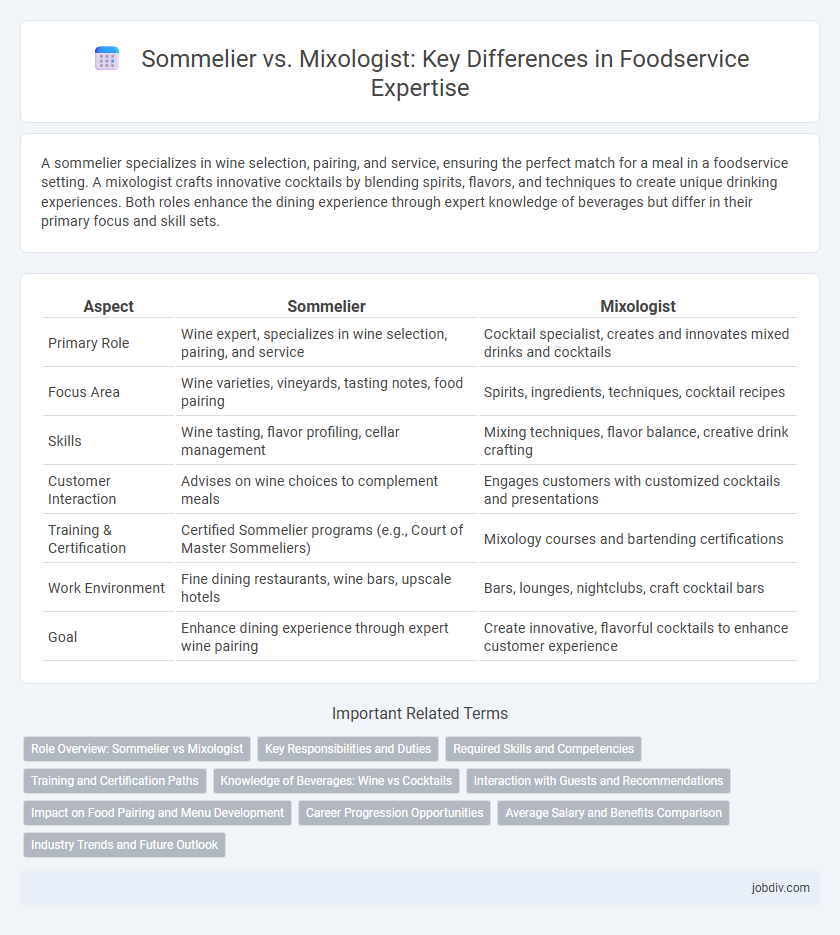A sommelier specializes in wine selection, pairing, and service, ensuring the perfect match for a meal in a foodservice setting. A mixologist crafts innovative cocktails by blending spirits, flavors, and techniques to create unique drinking experiences. Both roles enhance the dining experience through expert knowledge of beverages but differ in their primary focus and skill sets.
Table of Comparison
| Aspect | Sommelier | Mixologist |
|---|---|---|
| Primary Role | Wine expert, specializes in wine selection, pairing, and service | Cocktail specialist, creates and innovates mixed drinks and cocktails |
| Focus Area | Wine varieties, vineyards, tasting notes, food pairing | Spirits, ingredients, techniques, cocktail recipes |
| Skills | Wine tasting, flavor profiling, cellar management | Mixing techniques, flavor balance, creative drink crafting |
| Customer Interaction | Advises on wine choices to complement meals | Engages customers with customized cocktails and presentations |
| Training & Certification | Certified Sommelier programs (e.g., Court of Master Sommeliers) | Mixology courses and bartending certifications |
| Work Environment | Fine dining restaurants, wine bars, upscale hotels | Bars, lounges, nightclubs, craft cocktail bars |
| Goal | Enhance dining experience through expert wine pairing | Create innovative, flavorful cocktails to enhance customer experience |
Role Overview: Sommelier vs Mixologist
Sommelier expertise centers on wine selection, pairing, and cellar management to enhance the dining experience, emphasizing deep knowledge of viticulture and terroir. Mixologists specialize in crafting innovative cocktails, mastering spirits, flavor combinations, and bar techniques to create unique beverage experiences. Both roles drive customer satisfaction through specialized beverage service but focus on distinct drink categories and skill sets within the foodservice industry.
Key Responsibilities and Duties
A sommelier specializes in wine selection, tasting, and pairing, guiding guests through wine choices to enhance dining experiences while managing wine inventory and cellar maintenance. A mixologist focuses on crafting innovative cocktails, mastering bartending techniques, sourcing quality spirits, and creating unique drink menus tailored to customer preferences. Both roles require in-depth knowledge of beverages, but sommeliers emphasize wine expertise, whereas mixologists prioritize cocktail creativity and bar operations.
Required Skills and Competencies
Sommeliers require in-depth knowledge of wine regions, grape varieties, and tasting techniques, alongside strong sensory evaluation skills and customer service expertise. Mixologists excel in cocktail artistry, mastering ingredient pairing, flavor balance, and creative presentation with a thorough understanding of spirits, bitters, and syrups. Both roles demand excellent communication skills, attention to detail, and the ability to recommend beverages that enhance the dining experience.
Training and Certification Paths
Sommeliers undergo rigorous training through programs like the Court of Master Sommeliers and the Wine & Spirit Education Trust, focusing on wine knowledge, tasting skills, and food pairing expertise. Mixologists typically pursue certification through organizations such as the United States Bartenders' Guild or specialized cocktail courses that emphasize creativity, flavor profiles, and advanced bartending techniques. Both paths require a blend of practical experience and formal education, but sommeliers concentrate primarily on wine and beverage service, while mixologists specialize in crafting innovative cocktails.
Knowledge of Beverages: Wine vs Cocktails
Sommeliers possess in-depth knowledge of wine varieties, regions, vintages, and proper pairing techniques to enhance the dining experience. Mixologists specialize in crafting cocktails, understanding ingredient combinations, flavor profiles, and innovative mixing methods to create balanced and unique drinks. Both experts require extensive beverage knowledge, but sommeliers focus on wine expertise while mixologists master cocktail creation.
Interaction with Guests and Recommendations
Sommeliers specialize in curating wine selections tailored to guests' preferences by assessing flavor profiles and meal pairings, enhancing the dining experience through personalized recommendations. Mixologists engage guests by crafting innovative cocktails, combining expertise in spirits, ingredients, and presentation to match individual tastes and moods. Both professionals rely on deep knowledge and interpersonal skills to elevate guest satisfaction through thoughtful, customized beverage suggestions.
Impact on Food Pairing and Menu Development
Sommeliers specialize in wine selection, enhancing food pairing by recommending wines that complement specific menu items, thereby elevating the dining experience through nuanced flavor harmonization. Mixologists craft innovative cocktails that can introduce complex taste profiles, inspiring creative menu development and enabling restaurants to offer unique beverage pairings tailored to diverse dishes. Both roles significantly influence menu strategy by integrating beverage pairings that enhance flavors, boost customer satisfaction, and increase overall sales in the foodservice industry.
Career Progression Opportunities
Sommelier and mixologist careers offer distinct progression paths within the foodservice industry, with sommeliers advancing by specializing in wine expertise and often moving into roles like head sommelier or wine director at high-end restaurants and hotels. Mixologists, focusing on cocktail innovation and bar management, can progress to positions such as bar manager, beverage director, or open their own cocktail bars. Both professions require continuous skill development and can lead to consulting opportunities, brand ambassadorships, or teaching roles in hospitality education.
Average Salary and Benefits Comparison
Sommelier roles in the foodservice industry typically command an average salary ranging from $50,000 to $70,000 annually, with benefits often including health insurance, tips, and career advancement opportunities within upscale dining establishments. Mixologists, on the other hand, earn an average salary of $40,000 to $60,000, with additional income potential through tips and bonuses in bars, lounges, and event catering. Both professions may offer variable benefits based on location, employer size, and expertise level, but sommeliers generally receive higher base pay due to specialized wine knowledge and certification requirements.
Industry Trends and Future Outlook
Sommelier roles are evolving with technology integration, emphasizing precise wine pairings driven by AI analytics to enhance fine dining experiences. Mixologists are expanding into craft cocktail innovation, leveraging sustainability trends and locally sourced ingredients to meet consumer demand for unique, eco-conscious beverages. Both professions anticipate increased collaboration with digital platforms and immersive tasting events, shaping future foodservice industry standards.
Sommelier vs Mixologist Infographic

 jobdiv.com
jobdiv.com